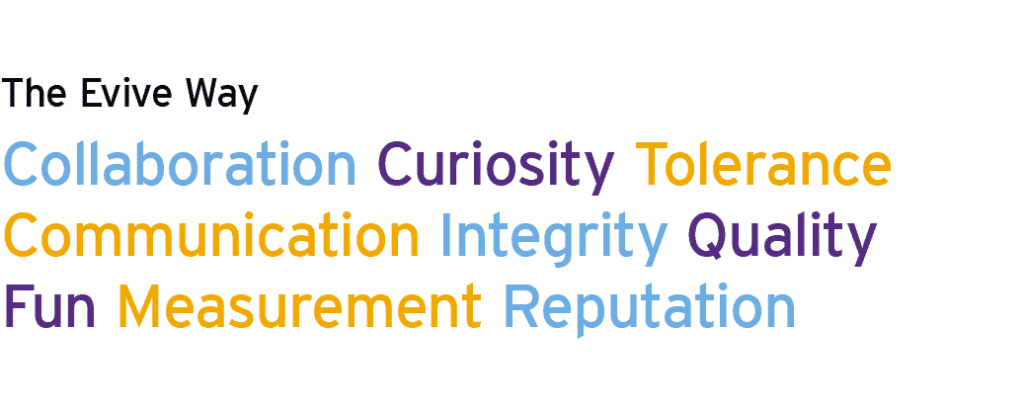Share:
Competitive salaries and tailored benefits attract great candidates—but companies can do even more to create exceptional employee experiences as they build the workforce they want. It’s called company culture, and it can be the difference between an employer that has to work to find good candidates and the one that star prospects actively seek out.
While corporate culture may seem like a soft element to some businesses, it’s become a significant influence on recruitment and retention in recent years, particularly among millennials.
At Evive, we take the idea of culture to heart. We operate according to an ethos called “The Evive Way,” a set of guiding principles for our work style and the values we aim to express in all of our interactions. Below are the characteristics of Evive culture that we work toward every day:

Ultimately, a major element of positive workplace culture is ensuring employees feel appreciated. By going beyond the “need-to-haves” to include the “nice-to-haves,” we create a powerful total-rewards package that reinforces our company’s culture.
Better benefits set up better culture
A couple of important factors we examine with our clients are, 1) who makes up their workforce, and 2) what those people care about. As I’ve written previously, it’s not enough to assume a few major demographics—it’s about tailoring to the individuals. This is an entryway into building the right company culture.
Take how we manage benefits for our two offices, one in Chicago and the other in Bangalore. Each office has its own unique population of employees—different things matter to each group, and different things matter within each group.
We’ve surveyed employees to learn about the benefits they prefer. Based on feedback in our Chicago office, we learned that the desire for vision coverage varied—of course, those who don’t wear glasses don’t find vision insurance valuable. Our solution? Introduce an extra $20 monthly allowance that employees could choose to put toward a vision plan (or another benefit, such as dental insurance). If they decide they don’t need either one, the money goes into their HSA; this, along with our HDHP, also shows how we walk our talk by promoting true consumerism in healthcare. Such flexibility allows our teammates to direct resources to the benefits they find most relevant, giving them more control and offering them more value.
In addition to surveys, we continuously assess the profiles of new hires and identify needs of current employees. For instance, knowing that our Bangalore team members are largely programmers—which by nature is a sedentary job that requires highly intensive work—we offer onsite yoga and zumba classes to help our colleagues there unwind. We also offer full breakfasts and lunches for our employees there to provide convenience, as well as to encourage more collaboration and relationship-building across the different teams. An analysis of our Chicago team, on the other hand, led to different conclusions and benefits. One example is a student loan reimbursement program that we recently introduced, as several of our Chicago employees face student loan debt. Another example is our paid time-off for volunteering—in response to employees seeking interest in volunteer opportunities so they can make a difference in the community, we’re showing that we share those values. Implementing this benefit allows us to help others, together as a company.
Embrace the quirks of your culture
Benefits serve their purpose as just one piece of the experience our companies provide. While we can be proactive about specific offerings, much of a company’s culture is developed organically. Think about workplace habits your colleagues naturally gravitate toward, as well as day-to-day occurrences that become rituals—then, consider benefits that can help encourage those occurrences.
For instance, we have Chicago colleagues who love Jeopardy!, and many gather to watch and play along on the TV in our kitchen lounge every afternoon. To support this activity, and to promote well-being in general, we always keep the kitchen stocked with healthy snacks and beverages.
Another ritual that came about is the Evive Book Club, which exists in both offices. Employees get together on a recurring basis to discuss a new book that the company provides, and each office picks books that pertain to the work they focus most on. For instance, the Chicago team picks topics that relate to behavioral economics, health, and business, while the Bangalore team reads about various technologies related to programming. It’s natural-born activities like these that contribute to the culture our company embodies.
As employers, we should also consider the interactions our teammates respond best to, that are consistent with our values and promote our specific culture—like benefits, these should be customized to the company and not one-size-fits-all! One Trader Joe’s worker described the many instances she observed over 7 years where employees’ mental well-being being was truly cared for, including a time when colleagues donated some of their PTO to an employee so that person could care for her father before heart surgery. Twitter is another company known to have happy employees, who often note “meetings on the roof, teamwork, friendly atmosphere, and an open dialogue with the execs” as positive aspects of the culture.
While attractive compensation and unique perks will always be crucial in a total-rewards package, the degree to which company culture can be the differentiator in a candidate’s choice is becoming much more apparent. To reach a truly ideal state for the employment experience you want to offer, remember that companies gain the most by creating the right mix of those three elements: salary, benefits, and culture.
This article was originally published on HR Technologist. View it here.






